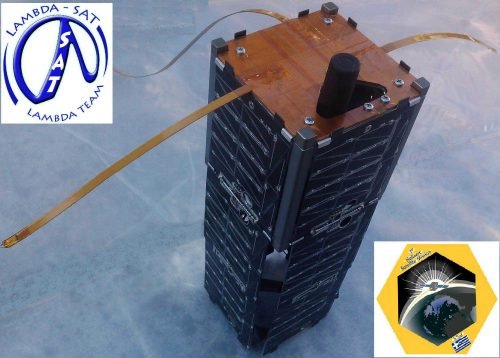Greek Minds at Work: The first Greek satellite is now a fact! It's him L-sat which was designed and built exclusively by Greek scientists. A promising project which is said to be original not only in the field of aerospace but also in many additional fields.

SecNews presents the faces and the initiators behind the group's grand venture L (Lambda) who has a dual business mission. It is the world's first material research "Graphene" under the influence of ionizing radiation and secondly it will serve as a communication platform through which it will be possible real-time monitoring of Greek merchant ships. Practically this according to the studies that have been done will significantly reduce the risk of both crews and goods from the phenomenon of piracy.
The contribution of Greek team scientists was very important L (Lambda) who helped complete the project. Their collaboration took place from many different parts of the world (California, New York, London, Greece) using all new teleworking and conferencing technologies. The team's love for space research and passion to prove how when we want and work together we can achieve a lot, was the connecting link that kept them united in the difficult course of satellite development.
L-sat was made entirely by Greek volunteers who worked feverishly, unfairly and without any personal benefit. The members of L-sat contributed to the construction of the satellite system, each with their knowledge in robotics, electronics, development for mobile devices to report the and telecommunications. The group consists of new children from Greece that traveled to Silicon Valley in California to participate in this project.
The Lambda (L) team wants to spread a message of optimism throughout Greece. The crisis, as they pointed out in a communication we had with them, It is NOT an excuse to reduce investment in research and development of technological innovations, because only with innovative products our country has the potential to play a leading role in the global market. Building a satellite is the best way to advertise globally that Greece has the most powerful minds and technological capabilities / skills that still touch the boundaries of space.
Ο L-sat was completed by the voluntary work of the young people and the financing of the project was covered by one of our compatriots, who financially supported the team at all stages of the project. The person who funded this effort wants to remain anonymous so far and the only condition he set for the team was: "MAKE THE COUNTRY AND ALL GREEKS PROUD"
The name of the L-sat satellite comes from letter (L) lambda reminiscent of Greece, sun, sea, Lithos (ie "Land of light"). The satellite will launch 1η July with her mission NASA and will remain at the International Space Station (ISS) for a month. From there it will be orbit around the earth, where it will perform scientific experiments attracting worldwide interest in the effort of the young Greeks.
"I want to encourage young children in Greece to continue to dream", states its original inspirer Project, Pericles Papadopoulos, Professor of Aerospace Engineering at the Federal University of California, San Jose, who has been awarded the NASA for his offer with the prize Turning Goals Into Reality (TGIR). As the professor points out, "My aim is to highlight the potential of young people in Greece". The professor considers that our country could be active in this sector and this is not economical theme, but only a matter of will (!).
The Greek doctoral student works in the field related to graphene research Costas Alexandrou under his direction internationally renowned Professor Ioannis Kymisis of Columbia University, New York, which he will carry out the world's first stress-test of graphene in space. Weightlessness, cosmic radiation and extreme temperature changes will all come in handy information about how they affect this revolutionary material. Graphene is one of the most important innovative "materials" of nanotechnology which is planned to be used in future transistors, in transparent and flexible screens, in batteries of the future and several other applications.
With regard to the field of telecommunications, the satellite L-sat to functionalhis AIS, will be able to identify and present in real time the movement of all Greek merchant ships, while providing information on ships that are threatened by piracy (!). The chief engineer played an important role in the completion of the satellite Vangelis Christodoulou with the help of Simos Kani in regional systems and h Ariana Panopoulou in the final certification tests. THE Haris Koulouris contributed to the creation of the software system. Also this project is carried out in collaboration with distinguished Professor Nikita Nikitakos and with the postgraduate student George Mantzouris of the University of the Aegean, who helped develop and implement AIS.
With the slogan Greek Minds At Work , the L-SAT team proves once again what we can do as Greeks, planning to launch the satellite for the next month with a mission NASA.
The launch will be broadcast live by pages NASA and L-sat:
http://www.nasa.gov/multimedia/nasatv
https://www.facebook.com/lambdateam
Source Secnews.gr









